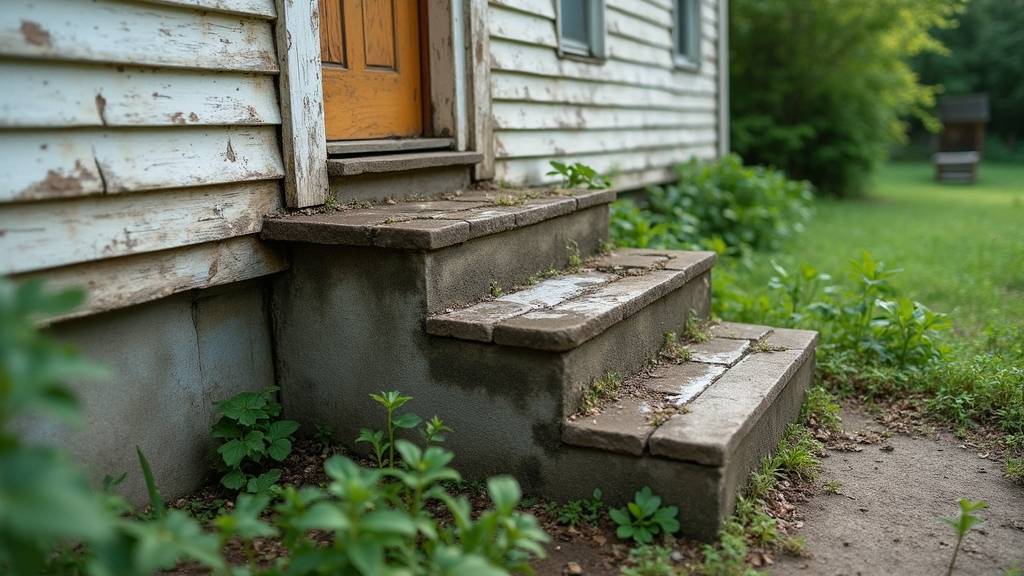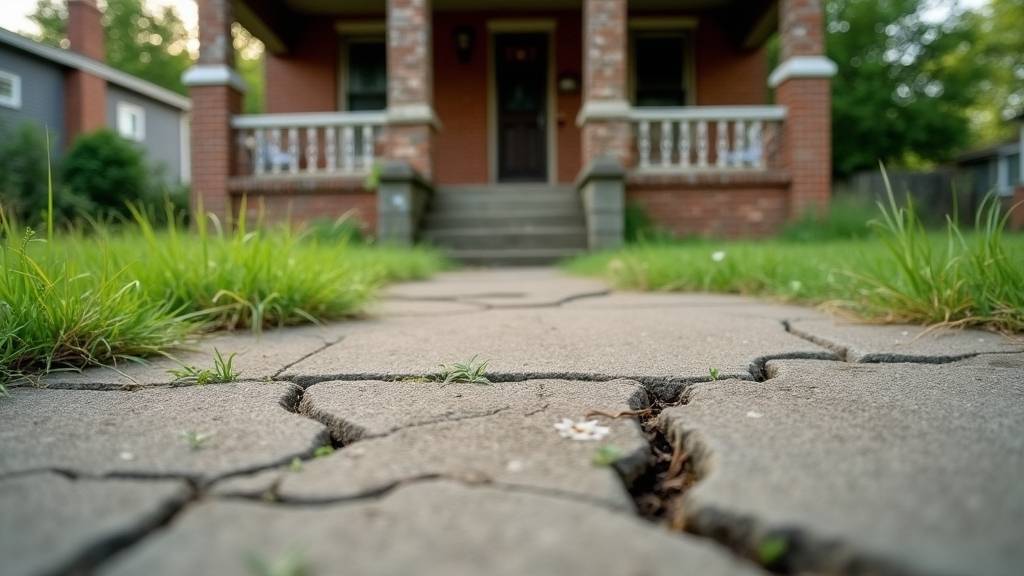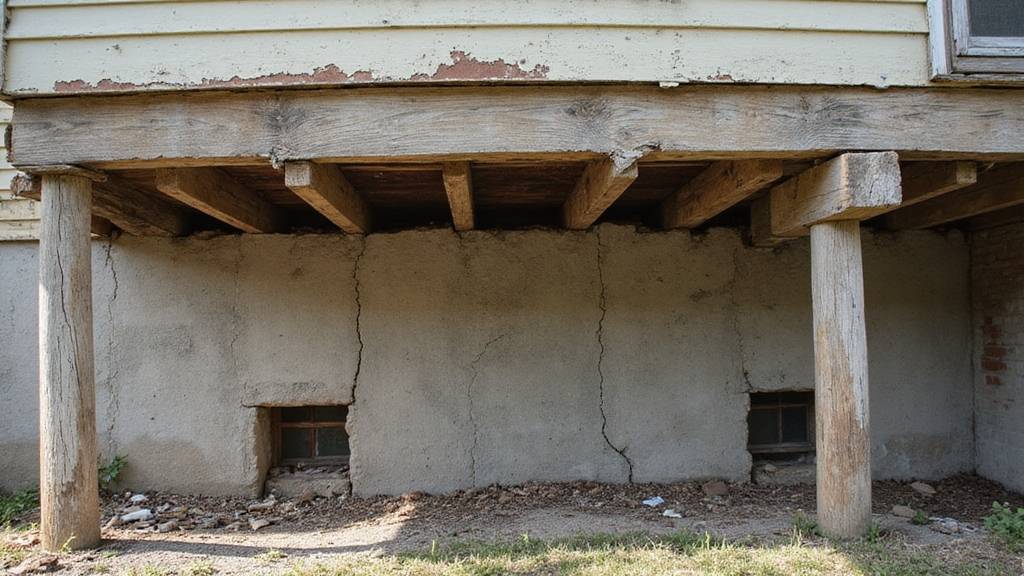Selling a house with foundation damage is tough. Many buyers walk away as soon as they see signs of trouble. This issue makes selling as-is even harder and can slow down your plans.
You might worry your home will sit unsold for months. The fear of losing money or facing legal trouble adds even more stress. Many homeowners feel overwhelmed by repairs and don’t know where to start.
You can sell a house with foundation damage as-is by being honest, setting the right price, and targeting investors. This approach helps you avoid repairs, saves time, and attracts the right buyers. This blog will guide you through each step so you can sell your home quickly and confidently.
Key Takeaways
- Disclose all known foundation issues in writing to comply with legal requirements and build buyer trust.
- Obtain a professional assessment and repair estimate to inform pricing and support negotiations.
- Target cash buyers, investors, and renovation specialists who are comfortable with as-is sales and structural repairs.
- Price the home below market value to reflect repair costs and limited buyer pool.
- Provide inspection reports and repair documentation to justify your asking price and facilitate faster transactions.
Understanding Foundation Damage and Its Impact on Home Value

Foundation damage can lower your home’s value because it creates structural risks. Buyers and lenders may avoid homes with foundation problems. This damage makes your property less appealing in the market. Proper inspection and disclosure are essential to manage expectations and facilitate a smoother sale process. If your foundation settles, it weakens your home’s structure.
Appraisers and investors often see these homes as risky investments. This can limit the number of interested buyers and reduce your sale price. People may worry about repair costs and legal issues if they buy a home with foundation damage. You should consider the repair expenses when setting your price. If you understand these impacts, you can set realistic goals and plan your sale better.
Signs Your Property Has Foundation Issues
Foundation problems can threaten your property’s safety and value. Several signs can tell you if your home has these issues. If you notice them, you may need repairs or a full inspection.
Cracks in walls or ceilings could mean your foundation is shifting or settling. Misaligned doors or windows may signal problems with the house’s frame. Uneven floors or sloping surfaces often point to soil movement beneath the foundation. Recognizing these signs early can also help you prevent further damage and make informed decisions about your sale.
Gaps around exterior frames can suggest the foundation has moved. If you find these signs, you should call a professional for an assessment. Early detection helps you handle repairs and answer buyers’ questions with confidence. Addressing foundation problems promptly can reduce repair costs and increase your chances of a successful sale.
Deciding Whether to Repair or Sell As-Is

You’ll need to assess whether the cost of foundation repairs aligns with your home’s current and potential market value. Factor in local real estate trends and buyer expectations, as unrepaired damage can significantly reduce your property’s appeal and final sale price.
Carefully weigh these variables to determine if selling as-is yields a better net outcome than investing in costly fixes. Considering the legal disclosure requirements and potential impact on the sale process can also influence your decision. If the foundation damage is extensive, exploring options like selling your house fast in St. Peters, MO for a fair cash offer might be a practical alternative to repairs.
Weighing Repair Costs
Before you decide to repair your foundation or sell as-is, find out how bad the damage is. Get estimates from professionals to know the repair costs. Compare these costs to your home’s value after repairs.
Foundation repairs can cost a lot if the damage is severe. If specialists or unique materials are needed, prices may go up. Always ask for detailed quotes from trusted contractors.
If the repairs are too costly, selling as-is might be better. Knowing the numbers helps you make a smart choice. Choose the option that gives you the best outcome for your situation.
Market Value Considerations
Your choice to repair or sell as-is will change your home’s market value. Repairs usually increase value and attract more buyers. If you skip repairs, your home may appeal mostly to investors or buyers paying cash.
A professional foundation inspection gives you facts to support your choice. If you repair, you may ask for a higher price. However, in some markets, repairs might not give you back all the money you spend.
If you sell as-is, buyers may offer less because of the risk. You should look at recent sales of similar homes to set a fair price. Weigh these factors to decide the best option for your situation.
Legal Disclosure Requirements for Foundation Problems
Most states require sellers to tell buyers about known foundation problems. You must disclose any issues like cracks, repairs, or water damage. If you do not, you could face legal trouble or financial loss.
Sellers who are honest about foundation issues can avoid arguments later. Buyers usually want all important details, especially if the home is sold as-is. If you disclose problems, you may get fewer offers, but buyers will likely be more serious.
You should check your state’s disclosure rules before listing your home. A real estate agent can help you follow these laws. Always fill out the required forms correctly.
Getting a Professional Assessment and Estimate

You’ll need to hire a licensed structural engineer to obtain an objective assessment of the foundation’s condition. Accurate repair estimates inform your pricing strategy and help you expect buyer negotiations. By understanding the scope of repairs and how they intersect with your disclosure obligations, you’ll position your property competitively in the market.
Additionally, working with a local North County, MO expert can ensure that assessments and estimates are aligned with regional building standards and market expectations. This local insight can also assist in evaluating regional building standards and how they impact repair requirements and disclosure processes.
Hiring Structural Engineers
A licensed structural engineer is needed if your house has foundation problems. The engineer will check how serious the damage is. This helps you understand exactly what needs fixing.
The engineer will give you a clear report after inspecting the property. This report explains the cause of the damage and what repairs are needed. Buyers and lenders often ask for this information before agreeing to a sale.
If you get an independent engineer’s report, you show buyers you are honest about the home’s condition. The report can help in price negotiations and reduce your risk of future problems. Selling your house as-is is easier if you have this expert documentation.
Understanding Repair Costs
Repair costs depend on the problems found in the structural engineer’s report. Homeowners should get detailed estimates from trusted foundation contractors. These estimates should match the engineer’s recommendations.
If you need repairs, these can range from small crack fixes to major foundation work. Accurate estimates help you choose between selling as-is or fixing the problem. If you plan to sell, buyers will consider repair costs when making offers.
Clear repair estimates can help you negotiate a better price. If you document costs, you show buyers you understand your responsibilities. Careful cost analysis helps you make smart decisions in your local housing market.
Evaluating Disclosure Requirements
Selling a house with foundation damage requires you to follow state disclosure laws. You must give buyers clear information about any known damage. If you fail to disclose this, you may face legal trouble or lose a sale.
Homeowners should get a professional assessment of the foundation. A written estimate should explain the damage and possible repair costs. This report helps buyers understand the issue and shows you are being honest.
If you share this information before accepting an offer, you meet your legal duties. Buyers expect full transparency before making decisions. Providing accurate disclosures can also make your home more appealing to serious buyers.
Determining a Realistic Asking Price
Foundation problems lower a home’s value. You should set your price lower than similar homes without these issues. If you price too high, buyers may not show interest. Foundation issues mean your home’s value drops, so price it below comparable homes to attract serious buyers.
Look at recent sales of similar homes nearby. Subtract the estimated cost of foundation repairs from their prices. This helps reflect the home’s true market value.
Buyers often expect a discount for extra risk and expenses. Good home staging cannot hide serious structural issues. If you want a quick sale, price the home honestly.
Work with a real estate agent who knows how to sell homes with problems. They can help you set a fair price using market data. This attracts buyers and may lead to a faster sale.
How Foundation Damage Affects the Selling Process
Foundation damage directly impacts your home’s market value, often prompting buyers to negotiate aggressively or walk away. You’ll also encounter hurdles with buyer financing, as lenders typically scrutinize structural issues before approving a loan.
It’s essential that you comply with strict disclosure laws, since failure to report known foundation problems can trigger legal and financial consequences. Additionally, selling to a local business that specializes in purchasing homes as-is can help you navigate these challenges more smoothly. Knowing the legal requirements for disclosing foundation issues is crucial to avoid future liability.
Impact on Home Value
Foundation damage can lower your home’s value. Buyers see it as a big risk and expect extra repair costs. Most homes with foundation issues sell for less than similar homes in good condition.
The home’s appraised value often drops due to possible future repairs. Fewer buyers are willing to purchase a home that needs foundation work. If you need to sell quickly, you may get lower offers.
Buyers may use foundation problems to ask for bigger discounts. Homes with known foundation issues often stay on the market longer. If you fix the damage, it may still affect your home’s value and buyer interest.
Buyer Financing Challenges
Foundation damage makes it harder for buyers to get a mortgage. Lenders usually need a home inspection before approving a loan. If the inspection finds serious foundation problems, most lenders will not approve the mortgage.
Buyers might only qualify for special renovation loans or need to pay in cash. FHA and VA loans have strict rules about property condition. Homes with foundation damage often do not meet their standards.
Sellers should expect longer selling times and more failed deals. Pricing must reflect these challenges. Setting realistic expectations with buyers is important in your local market.
Disclosure Legal Requirements
State laws require you to tell buyers about any known foundation problems. If you fail to disclose these issues, you may face legal trouble. This rule applies even if you sell the home “as-is.”
You must list all known foundation damage or repairs. Provide any inspection or engineering reports you have. If you do not have reports, state this clearly.
You should also mention any past or present water leaks, mold, or pests caused by foundation issues. Always fill out your state’s disclosure form honestly and completely. If you skip this step, you risk losing the sale or facing a lawsuit.
Proper disclosure protects both you and the buyer. Buyers need this information for their own safety and loan approval. If you are unsure, ask a local real estate lawyer for advice.
Targeting the Right Buyers for As-Is Sales
You should target investors, cash buyers, and renovation specialists when selling a home as-is. These buyers are used to handling properties with foundation problems. They can manage repair costs and are not scared by inspection reports. Additionally, selling your house without an agent can streamline the process and reduce fees, making it more attractive to these buyers.
Traditional buyers often need a mortgage, and banks usually want homes in good shape. If a property has big issues, these buyers may walk away. Lenders rarely approve loans for homes with foundation damage. If you focus on buyers who understand the risks, you may sell your home faster.
Investors and renovation specialists look at repair costs and potential profit. They are motivated to buy homes in need of work for future returns. Understanding the local real estate market can help you identify these motivated buyers more effectively.
Marketing Strategies for Homes With Structural Issues
Homes with structural issues can still be marketed effectively. Sellers should use clear communication and focus on the property’s other benefits. This helps attract buyers open to renovation. Even homes with structural issues can attract buyers if sellers communicate clearly and highlight the property’s best features.
Sellers should highlight strong points like updated systems or a good location. If the house has a nice layout, mention it. Buyers may overlook issues if other features stand out.
If possible, provide full inspection reports and repair estimates. This builds trust and avoids surprises later. Buyers appreciate honesty about the home’s condition.
Professional home staging can help the house look its best. Staging shows how spaces can be used and draws attention away from flaws. This can make the property more appealing.
If the neighborhood has good amenities, include this information. Show how nearby schools or parks add value. Buyers often care about the area as much as the house.
This approach may attract investors or buyers looking for a project. If buyers see a clear plan and value, they may still make offers. Transparent marketing helps sellers reach the right audience.
Additionally, emphasizing the benefits of selling to a local, trusted cash buyer can help sellers avoid lengthy traditional processes and ensure a quick sale.
Working With Real Estate Agents Experienced in As-Is Sales
Working with real estate agents experienced in as-is sales is important when selling a home with foundation problems. Such agents know how to handle homes with damage. They focus on selling properties exactly as they are, without repairs. These agents use home staging to show your home’s best features.
They help draw attention away from any flaws. If you want to sell quickly, they can make your home more appealing to buyers. Agents with as-is experience follow neighborhood trends closely. They set prices that match the current market. This helps attract buyers who understand the risks. If you choose an agent with these skills, you reach more qualified buyers. The agent can connect with investors and cash buyers.
This can make the selling process faster and smoother. Always pick an agent based on their knowledge of as-is sales, not just general experience. If you have a home with foundation issues, this choice matters. It increases your chances of a successful sale. Understanding the importance of market value can help you price your home appropriately and avoid undervaluing or overpricing it.
Negotiating Offers and Handling Lowball Bids
Buyers often make low offers when they learn about foundation issues. Sellers should use facts and clear records to negotiate better deals. Good negotiation helps you get a strong as-is sale. Use clear records and solid facts to negotiate a better as-is sale, even if buyers make low offers due to foundation issues.
Sellers can highlight recent repairs or upgrades that are not related to the foundation. This can help boost the home’s value in the buyer’s eyes. Home staging and open houses can help buyers see the home’s potential.
If you receive a low offer, you can respond with repair estimates and local home prices. Sellers should explain their asking price clearly to buyers. If there are several buyers, competition may raise offers.
Sellers should know their lowest acceptable price before talks begin. You can stay flexible if the buyer offers special terms. If both sides agree, the sale can close smoothly.
Being aware of local real estate market conditions can also give sellers an advantage during negotiations, especially when dealing with foundation damage. Additionally, understanding co-ownership laws can help in case there are multiple owners involved in the sale process.
Navigating Inspections and Appraisals
You need to anticipate thorough scrutiny during home inspections and prepare detailed documentation of any foundation repairs or assessments. Appraisers may factor structural issues into their valuation, so it’s crucial to understand how these findings impact your market positioning. By proactively addressing inspection results and appraisal challenges, you’ll protect your negotiating advantage and streamline the closing process.
Preparing for Home Inspections
Home inspections are important when selling your property. Inspectors will check for problems, especially with the foundation. If you prepare well, you can reduce buyer worries and help the sale go smoothly.
Sellers should gather all records of foundation repairs. These include engineering reports and contractor warranties. If buyers see these documents, they may feel more confident.
A transferable home warranty can make your home more attractive. This warranty should cover major systems and, if possible, foundation repairs. Buyers may appreciate this extra protection.
Make sure inspectors can easily reach crawl spaces, basements, and exterior walls. Clear any obstacles before the inspection. This helps the inspection process go faster and more smoothly.
If you know about any problems or past repairs, disclose them in writing. Written disclosure shows honesty and meets legal rules. Buyers may trust you more if you are open about issues.
Addressing Appraisal Challenges
Foundation damage can make the home appraisal process difficult. Appraisers look closely at structural issues and needed repairs. These problems often lower your property’s value.
Lenders use appraisals to decide if they will approve a loan. If the home has foundation issues, lenders may see it as a risk. You should know how these problems are measured and reported.
If you want to sell your house as-is, expect a lower appraisal. Prepare all repair records and engineering reports to support your asking price. These documents can help explain the condition and value of your home.
Selling to Real Estate Investors or Cash Buyers
Real estate investors and cash buyers are open to homes with foundation issues. They see these homes as investment opportunities, not problems. If your house has structural damage, you can sell it to them without making repairs.
These buyers care about the home’s future value after repairs. They usually do not worry about things like landscaping or interior updates. Their main concern is how much it will cost to fix the foundation.
If you choose this route, you may get a quick offer based on repair costs and current market value. These deals often have fewer conditions, making the sale process simpler. Transactions with investors or cash buyers can close much faster, sometimes in just a few days.
Preparing for a Smooth Closing Process
Selling a house with foundation issues can make the closing process complicated. You must prepare for special challenges when finalizing the sale. Careful planning helps avoid delays.
All required disclosures should be filled out truthfully. Missing or false information can stop the sale. A clean and tidy home shows buyers you are honest. Honest disclosures and a well-kept home reassure buyers and help keep your house sale on track.
If you price the house too high, buyers may hesitate. An early neighborhood appraisal can support your price. This step is important if buyers worry about repairs.
You should work closely with escrow officers and real estate attorneys. They will help with liens, title transfers, and needed inspections. If you keep buyers informed, the sale may go faster.
Good communication builds trust and helps prevent problems. If you stay organized, challenges are easier to manage. A smooth process is possible, even with foundation damage.
Conclusion
If you need to sell a house with foundation damage, you can still find solutions. If you prepare well and disclose all issues, you can attract buyers who are open to as-is purchases. If you set a fair price, you may draw interest from investors and cash buyers.
If you want to avoid long repairs or lengthy negotiations, you can consider companies that buy houses for cash. If you sell to a cash buyer, you can close faster and skip costly repairs. If you choose this route, you can move forward with less stress.
If you are ready to sell your house as-is, we at Freedom Path Investors are here to help. We buy houses for cash in any condition. Contact us today to get started on a simple and smooth sale.







